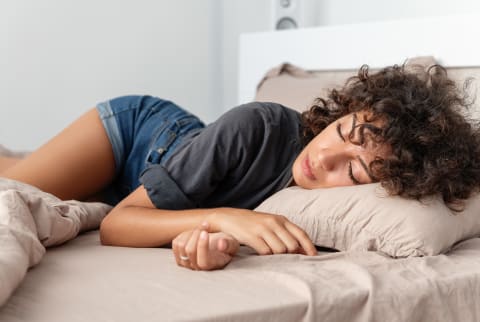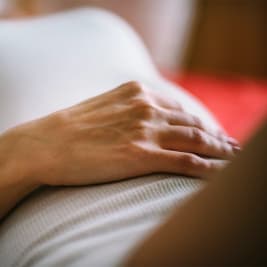New Research On Why Taking A Daytime Nap Is Actually Super Productive


Many people assume a quick nap in the middle of the workday will only result in even more exhaustion—but have you ever put this to the test?
If not, don't worry, because researchers did the heavy lifting for you. Here are the findings straight from a new study on the potential health benefits of napping—plus, how to make the most of your daytime snooze.
Advertisement
New research says daytime naps may be beneficial for your brain
A new study published in Sleep Health found a modest causal link between habitual napping and larger total brain volume1.
Researchers pulled data from UK Biobank2—an expansive dataset of over 500,000 adults that range from 40-69 years of age. Using a method called Mendelian randomization, or MR, they analyzed the association between biobank participants' daytime napping habits and their brain markers, such as hippocampal volume, reaction time, visual memory, and total brain volume.
They found people who reported taking naps during the day tended to have increased brain volume.
Brain volume sounds a little abstract, but it's essential to overall brain health. (According to one 2016 study, a higher total brain volume is associated with a reduced risk of mortality3.)
As we age, our brain volume tends to decline4, but the goal is to slow this process down. We've long known getting a good night's sleep can help protect the brain from deterioration, and this new research suggests even short naps can help achieve the same.
Previous research has shown that naps can also boost cognitive function5 and help you feel more energized throughout the day—making them even more of a productive habit.
So let this be a gentle reminder that taking a break during your work day to relax and even sleep is something to prioritize, not avoid. Listen to your body and schedule in a snooze when you need it—your brain will thank you.
Advertisement
How to optimize your nap
- Make it the right length: When it comes to cognitive benefits, it seems briefer naps are best. The cognitive function benefits seem to arise immediately following a brief nap 6(about 5-15 minutes long) and can last between 1 and 3 hours. After a long nap (30+ minutes), however, a temporary deterioration of performance emerges, followed by improvements that can last up to a day—so keep that in mind when planning your daytime nap.
- Don't ruin your sleep appetite: Napping too late in the day can compromise your sleep at night by making you less tired later and throwing off your circadian rhythm. "It's sort of like having a snack before dinnertime" and ruining your appetite, Wendy Troxel, Ph.D., a psychologist and sleep specialist, previously told mbg. "Similarly, if you take a nap late in the day, that can sap some of that drive for sleep, which you want at a maximal level at bedtime so that you're able to fall asleep deeply and quickly."
- Let some light in: Napping in darkness can "trick" your body into falling into a deeper sleep, Janet Kennedy, Ph.D., a clinical psychologist and founder of NYC Sleep Doctor, once shared. To avoid that, nap in a room with natural light or switch a light on.
All of this being said, some people simply can't nap. That's okay, too. There are plenty of other ways to support your brain health, from optimizing your nighttime sleep routine, to taking brain-boosting supplements, and so much more.
Advertisement
The takeaway
If you can fit a quick nap into your schedule, research backs its brain health and performance benefits. For those looking to further optimize their naptime, check out this guide to ideal time, routine, and more tips from sleep experts.
Advertisement

Hannah Frye is the Assistant Beauty Editor at mindbodygreen. She has a B.S. in journalism and a minor in women’s, gender, and queer studies from California Polytechnic State University, San Luis Obispo. Hannah has written across lifestyle sections including health, wellness, sustainability, personal development, and more. She previously interned for Almost 30, a top-rated health and wellness podcast. In her current role, Hannah reports on the latest beauty trends, holistic skincare approaches, must-have makeup products, and inclusivity in the beauty industry. She currently lives in New York City.
6 Sources
- https://www.sciencedirect.com/science/article/pii/S235272182300089X?via%3Dihub
- https://www.sciencedirect.com/topics/nursing-and-health-professions/biobank
- https://www.ncbi.nlm.nih.gov/pmc/articles/PMC4706101/#
- https://pubmed.ncbi.nlm.nih.gov/16461469/#
- https://pubmed.ncbi.nlm.nih.gov/34639511/
- https://www.sciencedirect.com/science/article/abs/pii/B9780444537027000099

